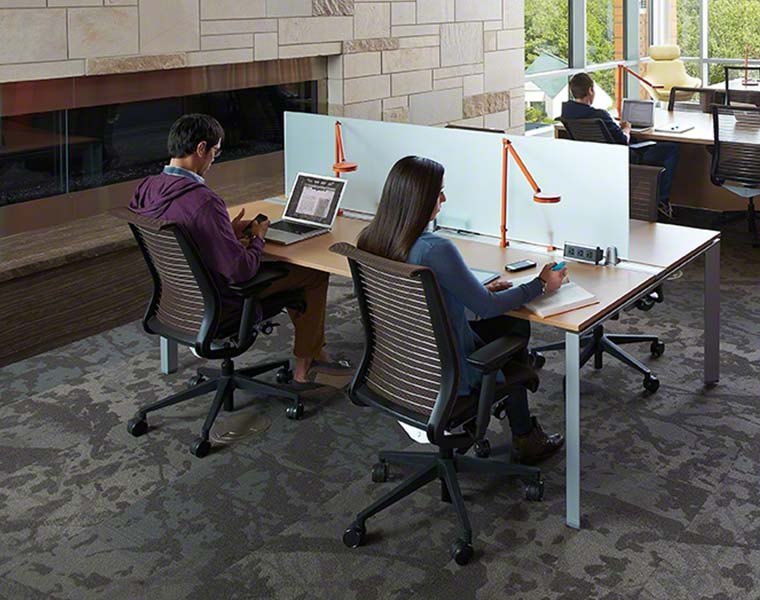In decades gone by, the office desk was a symbol of status. A dedicated desk was something to be celebrated and signified a more senior position in the professional hierarchy. As time went by, allocated workstations became the norm as workers sat in uniform configuration at their own personal desk space.
These days, attitudes are significantly changing towards rigid working patterns to make room for more agile modes of work and autonomous flexibility over how, when and where we carry out tasks.

One of the biggest traditions coming under fire is assigned workstations and here are some of the main reasons why we strongly believe the days of having a dedicated desk are (or should be) well and truly over…
Restricts freedom of movement around the workspace
The most obvious downside of dedicated desks is the limits on physical movement. Being forced to sit in one spot all day long poses particularly worrying problems for the health of staff, as well as their mental wellbeing.
A lack of movement during the working day dramatically increases the risk of serious diseases such as musculoskeletal issues and cardiovascular complications.

Solution: We recommend swapping at least some desks in your workspace for Sit and Stand desks and encouraging more mobile meetings whether it’s standing indoors or walking outside.
Ergonomics aren’t taken into consideration
The modern working world is far more flexible and diverse than it ever used to be. These days, design needs to meet the requirements of humans and not the other way around which is what ergonomic workspace design is all about.
Restricting employees to a dedicated workstation is an old-fashioned approach which completely overlooks the significant evolution in modes of working that has happened over the past decade.

Steelcase’s Global Posture Study uncovered 9 new postures that have evolved as a result of technology and devices which makes limits on movement around the workplace more problematic than ever.
Solution: Install ergonomic office furniture in a range of different workspaces. This will enable staff to adopt an array of postures and work modes comfortably and efficiently.
Hinders communication, especially in large offices
Not only is this static way of working bad for physical health and cognitive function, it also inhibits communication lines between individual members of staff and across the various teams.
Feeling unable to get up from the desk to work or interact means staff will be reliant on email and phone to communicate with their colleagues which leads to a breakdown in idea sharing and productivity.
Solution: Invest in some modular furniture which accommodates impromptu meetings and touchdown work as members of staff cross paths spontaneously between destinations.

Click for more advice on how to improve communication in a large office.
Counterproductive to collaboration and creativity
When freedom of movement and communication are hindered, collaboration and creativity are then compromised. Ditching the dedicated desk system and facilitating more agile ways of working will foster a more creative and collaborative environment in which ideas can be shared freely and processes become much more dynamic.
Solution: Incorporate purpose-designed collaborative workspaces within your office scheme where staff can go to work in a less structured setting. This will stop workers having to crowd around one computer screen.
Lower concentration and productivity levels
When employees are ‘chained to the desk’ as the saying goes, it creates restrictions that can lead to a frustrated and demotivated workforce. When staff are in this frame of mind, it can be extremely difficult for them to concentrate on the tasks in hand which then has a serious impact on productivity.

Solution: Provide a range of different workspaces which cater for different types of activity, from social spaces and collaborative settings to specific areas dedicated to private, focus work.
Dedicated desks can be a waste of valuable space
As the divide between resident and mobile workers becomes more equal and an increasing number of employees take advantage of modern flexibility, there is less need to provide a permanent desk space for every member of staff. Doing so could mean you’re wasting valuable space that could be being used more productively and cost-effectively.
Solution: Introduce more agile modes of work such as hot desking and remote working to limit the number of permanent workstations sitting redundant when their assigned member of staff isn’t ‘at the desk’.
